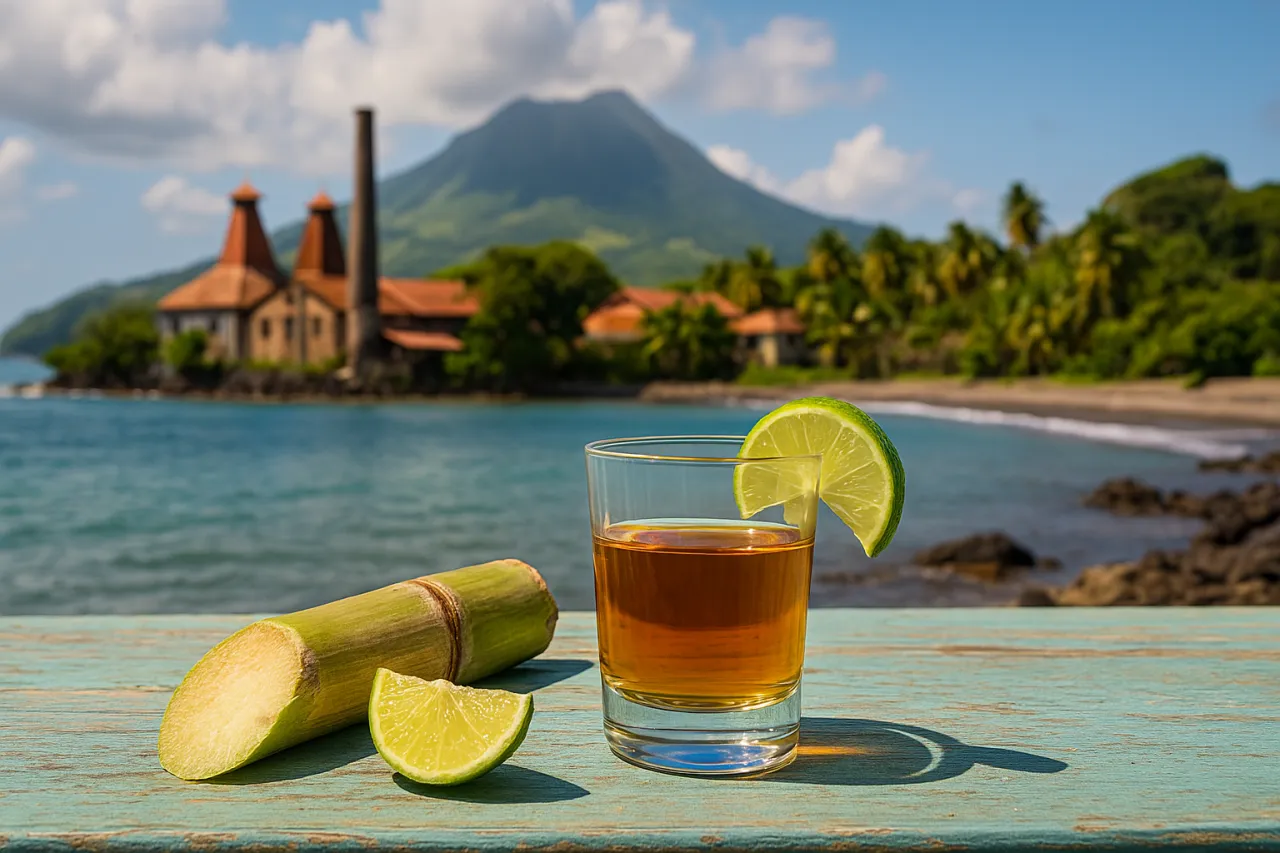The Rum Trail: Martinique – Terroir in a Glass

By Dave C & Boozeopedia AI Workflow
See how we write our articles
Following the boldness of Jamaica and the polish of Barbados, the Rum Trail now leads us to Martinique—a French Caribbean island where rum isn’t just a spirit; it’s an agricultural art form.
Martinique is world-renowned for rhum agricole, a grassy, aromatic style of rum made from freshly pressed sugarcane juice rather than molasses. (And yes, it's spelled rhum with an 'h'—a nod to the island’s French heritage and a tip-off that you’re sipping something a little more refined and terroir-driven.) Thanks to its Appellation d’Origine Contrôlée (AOC) designation, Martinique’s rum production is as tightly regulated as Champagne or Cognac, ensuring that every bottle reflects the island’s rich soil, tropical climate, and precise craftsmanship.
🏝️ A Brief History
Rum production in Martinique dates back to the 17th century, when French settlers established sugarcane plantations. Unlike British colonies that focused on sugar and molasses-based rum, the French influence encouraged distillation from fresh sugarcane juice, especially during sugar price crashes in the 19th century. This shift laid the foundation for rhum agricole.
In 1996, Martinique’s rhum agricole earned the coveted AOC designation, legally defining how and where the spirit must be produced. This makes Martinique the only region in the world where rum has such protections.
🔥 Distillation Style: Rhum Agricole and AOC Rules
Rhum agricole is crafted from 100% fresh sugarcane juice, fermented and distilled within 24 hours of harvesting. This rapid transformation captures the essence of the cane at its most vibrant, resulting in a spirit that’s dry, vegetal, and deeply expressive of its terroir.
The AOC regulations meticulously govern every aspect of production to uphold authenticity and character:
- Specific sugarcane varieties (such as Canne Bleue and B59-92, prized for their high sugar content and distinctive flavor profiles)
- Geographic origin (cane must be cultivated within approved areas of Martinique)
- Harvest dates (typically from February to June, when the cane reaches optimal ripeness)
- Distillation strength (between 65–75% ABV, preserving delicate aromatics and purity)
- Aging terminology and minimums (e.g., "VO" requires a minimum of 3 years, "VSOP" denotes at least 4 years, and "XO" or "Très Vieux" signals aging of 6 years or more in oak barrels)
This extraordinary level of precision ensures that every bottle of rhum agricole delivers a true sense of place—a bold, elegant spirit shaped by Martinique’s soil, climate, and artisanal traditions.
🥃 Tasting Notes
- Aromas: Grassy, herbal, lime zest, unripe banana, white pepper
- Palate: Dry, earthy, vegetal with hints of anise, citrus peel, and stone minerality
- Finish: Clean, crisp, with lingering sugarcane and herbal spice
🌟 Notable Martinican Rum Brands
- Rhum Clément: Known for both aged and white expressions; Clément VSOP is a standout for sipping.
- Rhum J.M: Produces complex, full-bodied rhums from volcanic soil and pure spring water.
- La Favorite: Family-owned and artisanal, often bottled at higher proof for intensity.
🍹 Best Cocktails for Rhum Agricole
- Ti' Punch: A Martinican classic made with white rhum, lime, and cane syrup—simple but powerful.
- Shrubb Spritz: A modern, citrus-forward cocktail that blends Liqueur Shrubb with sparkling wine—bright, bubbly, and unmistakably Martinican. A twist on the classic that brings a zesty, herbal edge and a more complex finish.
- Punch Planteur: A fruitier punch that balances rhum agricole’s dryness with tropical juices.
For more ideas, explore our Top 10 Iconic Drinks of the Caribbean.
🎶 Culture & Legacy
In Martinique, rum is an extension of the land and local pride. It plays a role in music festivals, ancestral rituals, and culinary traditions. Locals enjoy Ti' Punch before meals, and many distilleries open their doors to visitors to share their heritage firsthand.
While other rums blend or mask origin, rhum agricole celebrates it—earthy, elegant, and shaped by soil and sun.
Next up on the Rum Trail: Dominican Republic, where large-scale production and local favorites come together in a versatile rum culture.